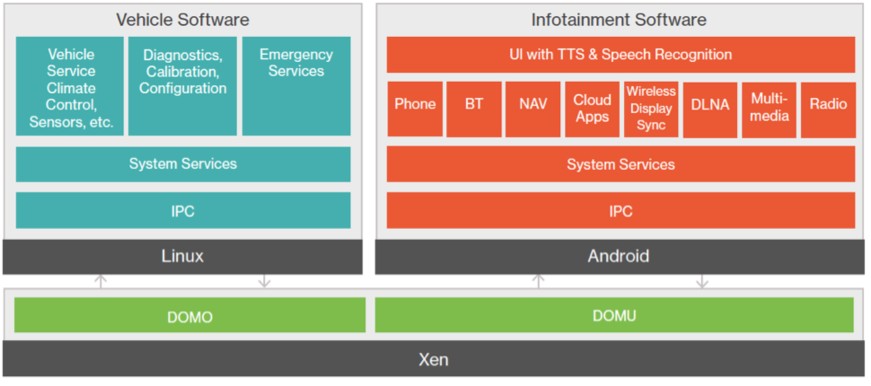 Alex Agizim, VP and CTO of Embedded Systems at GlobalLogic, had the opportunity to speak at Linux Foundation Collaboration Summit 2014, in Napa, about their use of the Xen Project Hypervisor for building OSS-based IVI (In-Vehicle Infotainment) systems. Here’s how he described his experience to Linux.com.
Alex Agizim, VP and CTO of Embedded Systems at GlobalLogic, had the opportunity to speak at Linux Foundation Collaboration Summit 2014, in Napa, about their use of the Xen Project Hypervisor for building OSS-based IVI (In-Vehicle Infotainment) systems. Here’s how he described his experience to Linux.com.
“The evolution of in-vehicle systems is a very exciting topic, and Collab Summit confirmed for me that automotive software is currently in a state of flux. Specifically, there is a gap between the conservative automotive industry and the demands of consumers (e.g., customization, connectivity, cloud, third party apps, etc.).
Today’s consumer products require a convergence of technologies, meaning it will become crucial to cultivate partnerships between different expertises. My own company, GlobalLogic, recently became a member of the multi-disciplinary Automotive Grade Linux steering committee to help develop an automotive-grade Linux platform. Furthermore, CollabSummit enabled me to meet with forward-thinking people in communications, electronics, and embedded technology. I am excited by the possibilities presented by these meetings, and who knows, maybe I will be speaking at CollabSummit 2015 on a breakthrough in-vehicle system resulting from the partnerships I created at this year’s conference!”
More thoughts from Alex on the state of In-Vehicle Infotainment appeared recently online in Embedded Computing Design. His recent blog IVI system sandboxing is worth a full read. The part more relevant to the Xen Project is reported below.
“By leveraging the Open Source, bare metal, Xen hypervisor, developers could simultaneously run two different OSs on a single System-on-Chip (SoC) to provide:
- Highly reliable automotive-grade Linux or Real-Time Operating Systems (RTOSs) like Autosar and QNX for mission-critical vehicle software
- Highly customizable Android for infotainment software
A hybrid architecture that is based on a Type-1 hypervisor would allow developers to create an Android-based IVI system without compromising the functionality, security, or reliability of the vehicle’s operational software. Critical components such as vehicle sensors, diagnostics, and emergency services would never be impacted by third-party apps, as they would be completely enclosed within their own respective OSs. Sandboxed Linux and Android operating systems give developers the freedom to create truly customizable infotainment software without negatively impacting a vehicle’s security or reliability.”

